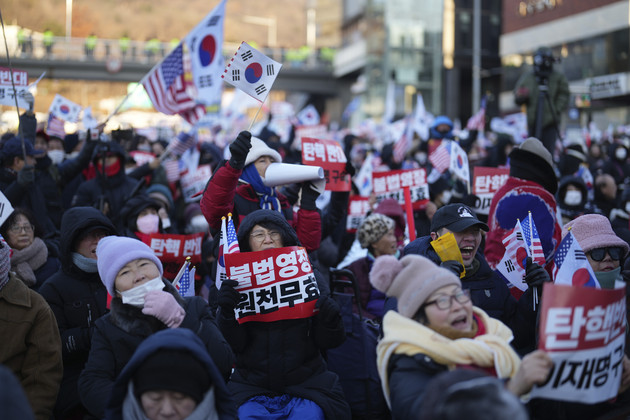Police Attempt Unprecedented Detention of Suspended President
On Friday morning, a dramatic and unprecedented event unfolded in the heart of Seoul, South Korea, as around 100 criminal investigators and police officers sought to detain the country’s suspended president. The president’s supporters and an elite security team, along with parked vehicles, turned the compound where the president was believed to be staying into a fortress.
The officials, led by the Corruption Investigation Office for High-Ranking Officials, encountered significant resistance as they approached the presidential compound. Two blockades of parked vehicles and supporters slowed their progress. However, the most formidable barrier lay just 650 feet from the building: ten buses and cars arranged to block access, along with 200 elite bodyguards and soldiers of the Presidential Security Service. This security team, comprising anti-terrorism experts and specially trained personnel, stood their ground, preventing the investigators from executing a court-issued warrant to detain the suspended leader.
Small scuffles broke out as investigators attempted to breach the final barrier. Despite their efforts, the overwhelming resistance forced them to retreat after a tense five-and-a-half-hour standoff. Only three prosecutors managed to reach the building where the president was believed to be holed up. Inside, the president’s legal team declared the warrant invalid, calling it “illegally issued.” This claim further frustrated the investigators, who ultimately left the compound without fulfilling their mission.
The independent agency that led the operation expressed deep regret over the failed attempt, accusing the suspended leader of obstructing justice by refusing to comply with the court’s decision. The standoff has left the nation in turmoil, raising concerns about South Korea’s political stability and democratic resilience.
Political Division and Public Outrage
The president’s impeachment by Parliament in December, following his declaration of martial law, had already polarized South Korean society. While his supporters remain fiercely loyal, public surveys indicate that a majority of citizens want him removed from office and held accountable for his actions. The authorities accuse the suspended leader of insurrection for deploying armed troops to the National Assembly during his brief military rule.
The political divide was evident outside the compound. Thousands of the president’s supporters, many of them older citizens, camped out in the cold, chanting slogans in his favor. They expressed unwavering support, viewing the security team as protectors of the nation’s leadership. On the other side, protesters demanding the president’s arrest gathered in equal determination. Their chants of “Arrest him!” echoed through the streets, reflecting the frustration and anger of those who feel betrayed by their government.
The standoff has also drawn sharp criticism from political experts and opposition parties. The failure to execute the warrant has been seen as a blow to the rule of law. Some critics have called the presidential security service “accomplices” in the alleged insurrection, accusing them of prioritizing loyalty over legal obligations. Meanwhile, many citizens view the suspended president’s reliance on his bodyguards as an act of cowardice, further eroding public trust.
Broader Challenges Facing South Korea
The political chaos comes at a time when South Korea is grappling with significant domestic and international challenges. The nation is still reeling from a recent aviation disaster that claimed the lives of 179 passengers. Labor strikes and rising household debt have added to the country’s economic woes, prompting the finance ministry to downgrade its growth forecast for the coming year.
On the international stage, South Korea faces uncertainty regarding its alliance with the United States, amid geopolitical tensions and shifting dynamics in the region. Neighboring North Korea has seized the opportunity to mock the South’s political instability, with state media describing the nation as being in a state of “sociopolitical confusion.”
The unfolding crisis has exposed vulnerabilities in South Korea’s democratic system. The president’s ability to mobilize elite security forces to shield himself from legal proceedings has raised questions about the balance of power and accountability within the government. As the Constitutional Court deliberates on whether to officially remove the suspended leader, the nation remains deeply divided, with its democratic foundations under strain.

